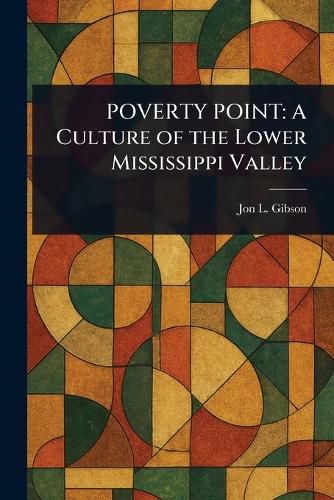Readings Newsletter
Become a Readings Member to make your shopping experience even easier.
Sign in or sign up for free!
You’re not far away from qualifying for FREE standard shipping within Australia
You’ve qualified for FREE standard shipping within Australia
The cart is loading…






This title is printed to order. This book may have been self-published. If so, we cannot guarantee the quality of the content. In the main most books will have gone through the editing process however some may not. We therefore suggest that you be aware of this before ordering this book. If in doubt check either the author or publisher’s details as we are unable to accept any returns unless they are faulty. Please contact us if you have any questions.
Explore the fascinating world of the Poverty Point culture with Jon L. Gibson's "Poverty Point: Anthropological Study No. 7." This meticulously prepared print edition delves into the archaeology of one of North America's most significant pre-Columbian sites, located in Louisiana. Discover the enduring legacy of the Native Americans who constructed the monumental earthworks, including the impressive mounds that define Poverty Point.
Gibson's work provides an insightful exploration of the Poverty Point culture, offering a valuable resource for those interested in anthropology, archaeology, and the history of the American South. Gain a deeper understanding of the social and cultural structures of this ancient civilization through detailed analysis and historical context. This book remains a crucial study for anyone seeking knowledge of Poverty Point and its place in the broader narrative of North American history.
This work has been selected by scholars as being culturally important, and is part of the knowledge base of civilization as we know it.
This work is in the public domain in the United States of America, and possibly other nations. Within the United States, you may freely copy and distribute this work, as no entity (individual or corporate) has a copyright on the body of the work.
Scholars believe, and we concur, that this work is important enough to be preserved, reproduced, and made generally available to the public. We appreciate your support of the preservation process, and thank you for being an important part of keeping this knowledge alive and relevant.
$9.00 standard shipping within Australia
FREE standard shipping within Australia for orders over $100.00
Express & International shipping calculated at checkout
Stock availability can be subject to change without notice. We recommend calling the shop or contacting our online team to check availability of low stock items. Please see our Shopping Online page for more details.
This title is printed to order. This book may have been self-published. If so, we cannot guarantee the quality of the content. In the main most books will have gone through the editing process however some may not. We therefore suggest that you be aware of this before ordering this book. If in doubt check either the author or publisher’s details as we are unable to accept any returns unless they are faulty. Please contact us if you have any questions.
Explore the fascinating world of the Poverty Point culture with Jon L. Gibson's "Poverty Point: Anthropological Study No. 7." This meticulously prepared print edition delves into the archaeology of one of North America's most significant pre-Columbian sites, located in Louisiana. Discover the enduring legacy of the Native Americans who constructed the monumental earthworks, including the impressive mounds that define Poverty Point.
Gibson's work provides an insightful exploration of the Poverty Point culture, offering a valuable resource for those interested in anthropology, archaeology, and the history of the American South. Gain a deeper understanding of the social and cultural structures of this ancient civilization through detailed analysis and historical context. This book remains a crucial study for anyone seeking knowledge of Poverty Point and its place in the broader narrative of North American history.
This work has been selected by scholars as being culturally important, and is part of the knowledge base of civilization as we know it.
This work is in the public domain in the United States of America, and possibly other nations. Within the United States, you may freely copy and distribute this work, as no entity (individual or corporate) has a copyright on the body of the work.
Scholars believe, and we concur, that this work is important enough to be preserved, reproduced, and made generally available to the public. We appreciate your support of the preservation process, and thank you for being an important part of keeping this knowledge alive and relevant.